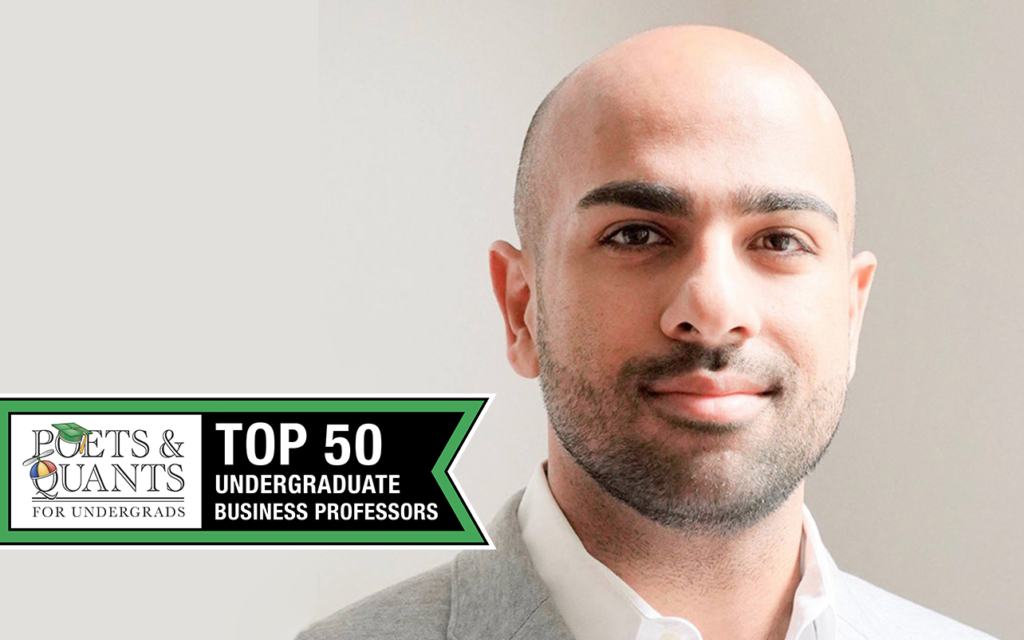
Alan K Koh
‘BRING BACK THE POETRY’
Several of the professors in our series hope to see outside disciplines incorporated into business curriculums.
“Often, the arts can help distill and crystalize notions from business and help students understand how abstract concepts can play out in real life. Also, once you start seeing business concepts in film, shows, books, and other media, you can never stop seeing them. That in turn leads to more creative and critical analysis of real-world situations,” says Aimee Barbeau of the Gies College of Business.
Meanwhile, Michael Hogg, Senior Professor of Practice and Area Coordinator, Business and Legal Studies at the A.B. Freeman School of Business at Tulane University, says business schools should pull in more concepts from science, engineering, and humanities to help students learn more about the importance of leadership and helping others. And Sharon McMillen Cannon, clinical professor of management and corporate communication at UNC Kenan-Flagler Business School, believes that weaving humanities and social sciences into the business curriculum will build better managers. “To me a future business leader should know the historical context of why we are where we are today and understand the emotional side of people at work,” she says.
Finally, Alan K Koh, succinctly declares: “Bring back the poetry!”
Koh, assistant professor of business law, is the youngest tenure-track business law professor at Nanyang Technological University Business School in Singapore. He wants more courses that “do not necessarily teach an immediately marketable skill like business analytics or programming, but rather prompt one to confront fundamental assumptions and interrogate them critically. Internalize and transmit – through teaching and administration – values rather than just skills, especially quantitative ones,” he says.
“What is valuable is not necessarily measurable, and what is measurable is not necessarily valuable.”
CREATING ETHICAL LEADERS
Other professors, like Aichih Jasmine Chang of the New Jersey Institute of Technology, would like more business ethics courses built on addressing such issues as social justice and inequality.

Suneal Bedi
“Business schools of the future would have more normative ethics components. I’d like schools to spend more time training students to articulate what they view is the right way to do business, to what should the role of business be in society at large,” says Suneal Bedi, assistant professor of Business Law & Ethics at the Indiana University Kelley School of Business.
Terri R. Kurtzberg believes that a greater focus on mentorship would help students develop a deeper sense of ethical behavior. “I wish our students also had more direct exposure to role models who make ethical choices—real people, in our classrooms, telling their stories to them. This is hard to scale, of course, and online or recorded options aren’t the same,” writes Kurtzberg, professor of management and global business at Rutgers Business School-Newark and New Brunswick.
“I wish we all had more time to mentor our students as individuals, and be a lifeline for them even once they graduate and launch their own careers. I do hear from some small number of former students each year who consult with me on their big decisions and negotiations, and it’s so rewarding…I wish we could have that kind of contact available for every student.”
ENTREPRENEURIAL, EXPERIENTIAL, DATA-DRIVEN, ADAPTABLE
Finally, there were several professors who believe the business school of the future should double-down on some of the hard skills already at the core of a business degree.
For example, if it were up to Alicia DeSantola, business school students would spend more time building or developing new products or services as part of the core curricula. “I think that all business school students—whether they want to lead a large company or start one of their own— have much to learn from the entrepreneurial mindset, and one of the best ways to develop that mindset is to learn by doing,” says DeSantola, assistant professor of strategy and entrepreneurship at the University of Washington Foster School of Business.

Alicia DeSantola
Sheri Lambert, assistant professor of practice in marketing at Temple University’s Fox School of Business, believes the business schools need to expand experiential learning even further. “Every business born today must think in global terms and embrace the reach it has,” she says. Christopher P. Long of the Peter J. Tobin College of Business at St. John’s University agrees: “These types of learning environments can be challenging to organize and manage. When done well, they create maximum impact for students. The push to hybrid and on-line learning is creating interesting spaces for experiential learning opportunities.”
The future of business lies in better data-driven decision making, says Ben Moseley of Carnegie Mellon’s Tepper School of Business. “The business school of the future will have data-driven decision making integrated at every part of the educational curriculum and research.”
And finally, the future business school should be adaptable, ready to change with the workforce it purports to prepare students for.
“The business school of the future will look a lot more like the businesses that we study. We will need to anticipate the market and create a service that is highly valuable to our students and other stakeholders,” says Eric C. Larson, the James F. Towey Faculty fellow and associate head of business administration at the Gies College of Business.
“One of the interesting realities is that the businesses we study are also changing quickly so it is not a static target. Digital and generational changes will force businesses and business schools to be something we have not yet imagined.”
DON’T MISS: POETS&QUANTS TOP 50 UNDERGRADUATE PROFESSORS OF 2021 AND AFTER COVID RESTRICTIONS, TWO CUTTING-EDGE VILLANOVA LABS GET A REBOOT











Questions about this article? Email us or leave a comment below.